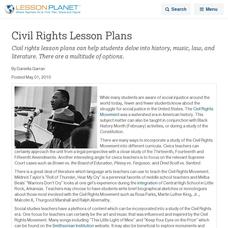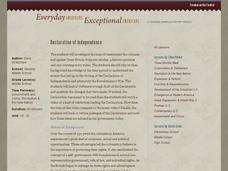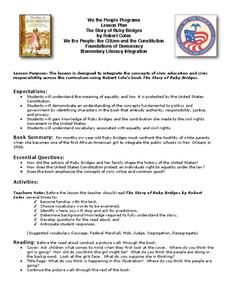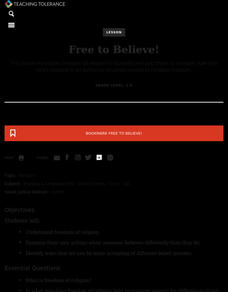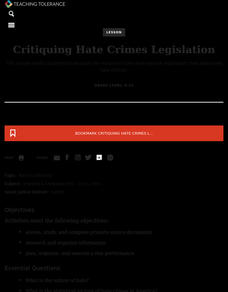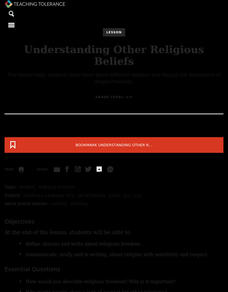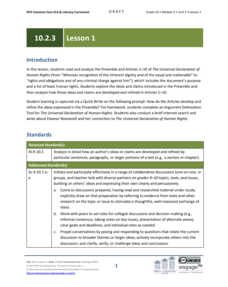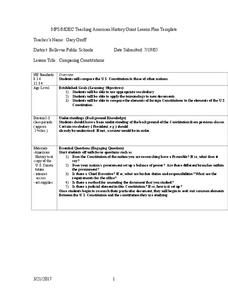Curated OER
American Civil War Lesson Plans
Civil War lesson plans can get students thinking about, and discussing issues related to history, politics, and even photography.
Curated OER
Civil Rights Lesson Plans
Civil rights lesson plans can help students delve into history, music, law, and literature. There are a multitude of options.
Constitutional Rights Foundation
If Men Were Angels: Teaching the Constitution With the Federalist Papers
Much like the methods of group work, the writers of the Federalist Papers worked together to advocate for their viewpoints against the anti-federalists. The resource enables learners to break into small groups and conduct research before...
Curated OER
US Constitution
Think about the Bill of Rights and the Declaration of Independence with your budding historians. They analyze the importance of historical documents by examining several famous documents, and then they complete activities that check...
Roy Rosenzweig Center for History and New Media
Declaration of Independence
Give budding historians a guided exploration of the Declaration of Independence, historic photos, videos, and more as they deepen their understanding of the American Revolution and the attitude of the colonists leading up to the war.
Curated OER
Vocab Grabbing the Preamble to the U.S. Constitution
Students identify concrete and abstract nouns in the preamble to the Constitution, and complete Frayer Model graphic organizers using history and current events as examples of American values. For this preamble lesson plan, students use...
National Endowment for the Humanities
Chief Executives Compared: The Federalist Papers
Delve into the responsibilities of the president by looking at President Hamilton's opinion of the presidential office in his own words. The second in a three-part series, the resource also offers an interesting compare-and-contrast...
Curated OER
We the People: The Citizen and the Constitution
Robert Coles’ The Story of Ruby Bridges forms the basis of this powerful cross-curricular study of civic education and civic responsibility. Class members consider how the book presents authority, responsibility, justice, and privacy.....
Judicial Branch of California
Fayette v. Take Two: The First Amendment
An informative lesson provides scholars the opportunity to study a Supreme Court case regarding the First Amendment and make a ruling with the members of their group. Class members also participate in group discussion and prepare a...
Teaching Tolerance
The True History of Voting Rights
Explore what voting rights really are in an intriguing activity that explores the history of American voting. The resource examines the timeline of voting rights in the United States with group discussions, hands-on-activities, and...
Judicial Learning Center
Judicial Independence: What’s Wrong with This Court?
Why is it important for judges to operate independently of politics or other branches of government? Scholars ponder the question as they examine video clips, case studies, excerpts of the US Constitution, and an interactive computer...
Teaching Tolerance
Free to Believe!
The United States: One nation with countless religions. An interesting lesson focuses on the freedom of religion protected under the First Amendment. Academics learn why it is important to protect all religions, why there is a separation...
Curated OER
The American Revolution: Creating a New Nation
The American Government was founded on several major principles which led to the US Constitution, Federal System, and Bill of Rights. This presentation follows Colonial America on its journey from colony, to freedom fighter, to...
Judicial Learning Center
About Federal Judges: Qualifications of Judges
"Help Wanted: A Supreme Court Justice." What should be included in the ad? Learners ponder the question during a lively activity that asks them to examine the qualifications for various federal offices and then create job postings....
Teaching Tolerance
Critiquing Hate Crimes Legislation
The high school lesson explores what hate crimes are and how the government has responded to those crimes. Academics read legislation, analyze political cartoons, and complete hands-on-activities to understand what motivates individuals...
K20 LEARN
Bill of Rights: Do I Have a Right?
Aliens have taken over the United States! Citizens can only keep two rights laid out in the first 10 amendments of the Constitution and must figure out which ones are best. Young scholars research the importance of each amendment and key...
Teaching Tolerance
Changing Demographics: What Can We Do to Promote Respect?
America has always been seen as a melting pot to the world. Scholars research the concept of blending cultures in the United States and how it is changing over time. The final lesson of a four-part series analyzes the changing...
Teaching Tolerance
Understanding the Prison Label
Break the chain. An engaging lesson examines why it is so hard to break free of the prison system in the US. Academics participate in a reader's theater, read primary sources, and discuss their thoughts. The lesson explains the hardships...
K20 LEARN
Deconstructing Reconstruction: The Reconstruction Era
High schoolers examine the Reconstruction programs instituted following the American Civil War, the potential for change these efforts offered, and the realities that occurred. Guided by a PowerPoint presentation, class members read a...
Teaching Tolerance
Racial Disparity in the Criminal Justice System
Explore the impact of the war on drugs in a thought-provoking lesson plan for high school academics. Young historians delve into the world of the criminal justice system and the racial disparity that occurs in the US. The resource...
Teaching Tolerance
Understanding Other Religious Beliefs
Learn what it means to respect others in an engaging instructional activity on religious beliefs. An inclusive resource focuses on understanding other religious beliefs, the right to freedom of religion, and the U.S. history of religious...
EngageNY
Grade 10 ELA Module 2: Unit 3, Lesson 1
Scholars examine the Universal Declaration of Human Rights and analyze the ideas in the preamble. Readers define new vocabulary words, listen to a Masterful Reading, answer questions in pairs, participate in a jigsaw discussion, and...
National Endowment for the Humanities
Lesson 2: The Debate in Congress on the Sedition Act
Pupils research and discuss the provisions in the Constitution that supported the arguments for and against the Sedition Act. They articulate objections to and arguments in favor of the Sedition Act.
Curated OER
Comparing Constitutions
Students compare and contrast plans for government. In this government systems lesson, students compare and contrast the U.S. Constitution to the constitutions of selected countries using the provided checklist as a guide. Students...



